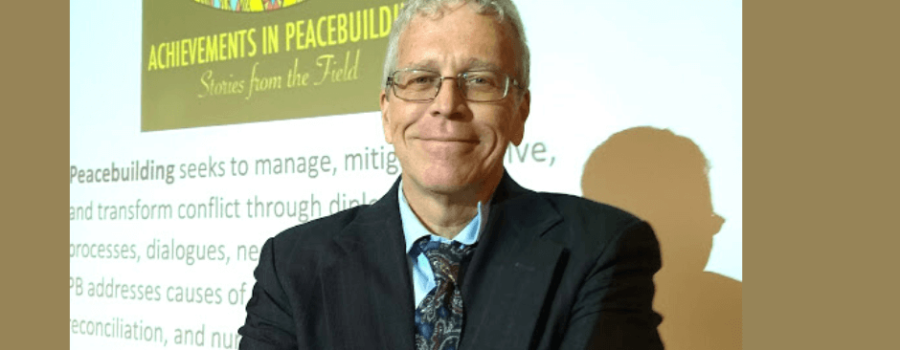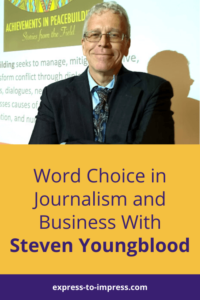Word Choice in Journalism and Business With Steven Youngblood
Hello! It’s Kristine here with the Express to Impress podcast. This week, I am excited to welcome a very special guest to the show. I am joined by Steve Youngblood, a communications and peace studies professor at Park University. We will be talking about the importance of word choice when telling a story.
Can’t read it now? Pin it for later!
Introducing Steven Youngblood
First, I’d like to share some information about Steven. He was a two-time Fulbright Scholar in Moldova and Azerbaijan and served as a U.S. State Department Senior Subject Specialist in Ethiopia in 2018. He writes and produces the blog “Peace Journalism Insights” and has been recognized for his contributions to world peace by the U.S. State Department, Rotary International, and others. Alright, let’s get started!
Kristine
I’ve been looking forward to this conversation. Welcome to the Express to Impress podcast. Steven Youngblood has been integral in training journalists throughout the world on peace Journalism, and I’m really happy to have you here today. We are going to be talking about the importance of choosing words carefully to frame a story. And Stephen, I would love for you to introduce yourself more and tell us about your work.
Steven
Thank you, Kristine. So first of all, it’s my pleasure to be here. Like you, I’ve been looking forward to our conversation. So as you mention, my name is Steven Youngblood. I’m the Director of the Center for Global Peace Journalism at Park University. I’m also a Communications and Peace studies professor.
So we’ll get into what peace journalism is in a minute, but essentially my work with peace journalism involves working with and training students, journalists, academics, and others in the ways of peace journalism. I’ve been lucky enough to have essentially traveled the world doing this. I’ve done seminars in 27 different countries. I’ve got another, I think it’s about 15 via Skype, and it’s just been an amazing experience being able to meet and collaborate with and to teach, but most importantly, to learn from my colleagues and all these interesting disparate places.
So during the pandemic, like everyone else, we were pretty much confined to Zoom, but we’re getting out there in the world again. So I did my first face-to-face event a couple of months ago in Ivory Coast. I have events planned this summer for two very different places–Hawaii and for Pakistan. Then in the fall, I’ll be going to Nepal and to Kosovo. Again, two very different places. So I look forward to our discussion, especially on language, because it’s such an integral part of what peace journalism talks about.
Kristine
And you have a book as well–you didn’t mention that.
Steven
I do. So, I wrote a textbook. Actually, I have two books. I wrote a memoir some time ago that talks about my experiences in Uganda, teaching and traveling, and trying not to get run over by rhinos. That’s an actual thing! It’s called Professor Komagum, K-O-M-A-G-U-M, and I also wrote a textbook on peace journalism called Peace Journalism Principles and Practices.
Word Choice in Journalism and Business Stories
Kristine
My listeners tell stories about themselves about their organizations, and often they must tell stories about difficult events. So in a job interview, someone might have to explain why they lost their job. A leader may have to tell a story to their staff to explain why they let someone go, explain their ideas and their plans for dealing with a crisis, or explain why their revenues declined. Some people may have a very small audience. Others working for large organizations could potentially have a huge audience that extends far beyond their organization. And often, the stakes are high. If they don’t succeed, they won’t reach their goal, or they could cause fear and panic. So no matter if they have an audience of one or an audience of millions, it’s really important they frame their stories carefully. And when I think about framing a story carefully, I would think business professionals could learn a lot from journalists, especially peace journalists. So I would love to hear your thoughts on framing stories and what you teach your peace journalism students about framing stories.
Steven
So framing, like word choice, is one of the most important areas that we discuss in peace journalism. So from a journalism standpoint, framing is how you tell the story. So we know as a journalist that even unpleasant news that angers people, that stirs people up, we know that it’s still news and still has to be reported–just like someone in a business setting knows that information about layoffs, information about having to pull a product or recalls or any unpleasant information, that it has to get out there because if it’s not out there then it becomes a rumor and as we know rumors are inherently toxic, right? So the question should never be, do we withhold the information? The question should be how do we convey the information.
Now from a journalism standpoint, I would think and hope that we would convey the information in a way that, at minimum, doesn’t pour gasoline on the fire. So I would hope that we can convey information in a way that at least lets societies consider and value nonviolent responses to conflict. And indeed, that’s part of the definition of peace journalism. Peace journalism is when reporters and editors make choices that can create an atmosphere conducive to peace? So what we’re doing is not ignoring bad news, but we’re considering how we frame the bad news. How the words that we use when we tell the story that contains the bad news. And so that’s really at the essence of peace journalism.
It’s interesting, I have a colleague at a local business who just sent me an email today from their H.R., and they’re going to be doing some buyouts. And I thought the wording, and I noticed because I knew we’re going to have this conversation the very careful word choice and framing in that, in that correspondence, that said “Well you know we’re still fine, and we’re solvent, and we’re paying our bills. We’re just looking forward; we’re doing this as a matter of, we’re taking care of our long-term viability.” I thought it was clever the way that it was phrased even though it was clearly couched in the euphemism and maybe business-speak. Maybe that’s okay in business; I don’t know. You can tell me; I don’t know.
Kristine
Yeah. So it’s interesting because one of the things I often teach people to do in interviewing is to speak directly, get to the point, and spell it out, so there’s no ambiguity. But, when it comes to framing a story so that you look good or so that you don’t cause panic, we tend to use more vague language and require people to read through the lines–read between the lines. And that can be very confusing for non-native English speakers. Okay. So are, are, are you direct, or are you indirect? So with peace journalism, do you talk about that, where that need for honesty, but you know, using language that allows people to read between the lines a little bit and, and provide some assurances or not?
Steven
See, I would say in journalism, no. We want something that’s direct. So the lines that we draw are between the direct and the sensational. So, for example, it’s perfectly fine to write in an attack on a subway, ten people were killed. That’s what happened, and that’s fine. But there’s a line that you cross in peace journalism when you say in a brutal, ugly, vicious attack on a subway, ten people were brutally slaughtered and a bloody massacre. Right?
Kristine
Yeah. Huge difference.
Steven
Yeah, so the first, the first phrase conveys all the information. It’s the second phrase that has sensationalism and so on. So that’s a very stark example, but I think that that shows the distinction between, in journalism terms, between direct, which is good, and sensational, which in my opinion, is not good.
Peace Journalism Success Stories
Kristine
Yeah. Makes sense. And I’m curious, do you have like a success? I mean, you have so many success examples in so many places you’ve traveled to do this training. But can you tell the listeners, like one of the success examples you’re proud of?
Steven
Sure. While there, as you say, there are many, many of these. So two that pop into my head immediately in Uganda, where I did a, as I mentioned, I did a year-long project, and I’ve been back three or four times. So there’s a group of journalists who have started what they’re calling the refugees online network in Uganda. So Uganda, unbeknownst to most Americans, hosts more refugees than any African country. And so this is a country that is a very low-income country. And, despite the economic strain that the refugees are putting on the country–putting on Uganda–Ugandans have overwhelmingly welcomed them with open arms. So this project involving the journalists is the establishment of this network to tell refugee stories. But not just that, to team up refugee journalists with Ugandan journalists to tell these stories.
And you’re telling not just the stories about the refugees but the stories about the communities that host the refugees as well. Another example I’m working on and have been working on is a project for the last two years with an organization called the East-West Center, which is a state department grantee located at the University of Hawaii, that does all kinds of programming to make connections between the U.S. and Asia, or connections within Asia. So this particular project is called the Cross-Border Reporting Project, and it involves teaming up Indian and Pakistani journalists to report on issues of mutual importance, report about issues like scarcity of water, agriculture, COVID, and climate change. I don’t know if you’ve read, but the last month, in Indian Pakistan, it’s been 120 degrees. I mean, literally. So certainly, those are issues of mutual importance. So that would be those would be just two examples among many peace journalism projects that have come to fruition.
Kristine
That’s incredible. And I imagine with your work, a lot of the accomplishments are the lack of conflict resulting from, you know, journalism that incites. And so it, it’s a little bit intangible in a way.
Steven
So it’s hard to prove something that you prevented.
Kristine
Exactly.
Steven
What I always tell the journalists is that peace journalism by itself is not going to bring peace. So peace is a recipe that requires many, many ingredients, and peace journalism, media that doesn’t promote conflict, media that gives peacemakers a voice that gives a voice to the voiceless, and so on, peace journalism is just one ingredient in this recipe.
Mistakes Journalists Make When Telling Stories
Kristine
And can you tell me what, you know, what are some of the mistakes that journalists make when telling stories?
Steven
This is something in my peace journalism course. We always spend some time going over some of the sorts of problems inherent in traditional journalism. So I mentioned sensationalism. So traditional journalism can be very sensational. More interested in getting clicks and getting likes and getting reads than in telling the story in a straightforward way.
One of my most recent and, should I say, most vehement, strongest criticism of media is that it’s partisan. And so we see this partisanship related in many different ways. Certainly overseas, it’s easy to see this sort of us versus them framing. All one has to do is look at Israeli media and look at Palestinian media to see the very stark difference between the two. Now you can look at Russian media and at Western media, and again, you see this us versus them framing, very partisan, sectarian framing of the news here in the U.S., it goes without saying, so you have a, a portion of Americans who still believe that the 2020 presidential election was somehow stolen, even though there is no evidence of this. You still have those who believed that the January 6th insurrection was nothing more than a group of tourists taking a tour through the capital. You know, that’s not the case as well.
So you have these partisan narratives that journalists everywhere engage in, and what peace journalism talks about is taking a more balanced approach, taking a more nuanced approach. So part of the problem with the partisan narratives is it’s very selective; it selectively presents information. When it does present information, it’s often distorted. It’s often not presented in context. So peace journalism looks to cure all of those ills in terms of partisan media.
Identifying Reliable News Sources
Kristine
With so much media that is not following peace journalism standards, where should people get their news? You know, I really enjoy NPR and some of their podcasts. And I tend to think that they are more apt to share facts; to provide information with fewer biases. But I’m curious, where do you tell your students to look to for examples of this?
Steven
Right. Well, you won’t be surprised that this is probably the question that I get asked most often. And the answer is if you want to be an informed person in 2022, that this is going to take an effort. So the first thing I tell my students is not to depend on social media for their news. This, despite the fact that study data shows that that’s exactly where they get their news from. So when they ask people, “Where do you get your news?” it’s quite a generational divide. So for younger people, it’s predominantly social media. For older people, it’s predominantly more traditional media–what we would call more traditional media. Now, what’s the problem with getting your news from social media? Well, another study or several other studies have shown that those who get their news from social media are very poorly informed.
They’re either uninformed or ill-informed. And the way that you figure this out is pretty simple. So you, you get a big group and, or many big groups, and you ask them where they get their news. And then, over a period of time, you give them news quizzes to see what they know and what they understand about the news. And there is a direct correlation between being news ignorant or news illiterate and getting your news on social media. So that’s the first thing I say is, do not get your news from social media. In terms of what sources to choose, I think good advice is always to try to look at a variety of sources. So if you are someone who happens to believe that Fox News is the gospel truth, I’m not going to dissuade you in these next few minutes, but I will tell you if you love Fox News, then to be an informed person, you need to watch MSNBC, too.
And if you think that the New York Times and CNN are the be-all and end-all, then you need to look at breitbart.com. You need to look at News Max or Fox News to get a fuller picture. So I tend to land on the liberal end of the scale. And so, for me, I have to torture myself several times a week by watching Sean Hannity or one of his, Tucker Carlson, one of those guys on Fox news. Now frequently, I’m throwing things at the television. I think it’s important for a media consumer to know what’s going on across the political spectrum. Now, in terms of more neutral sides and more neutral sources, you mentioned NPR, and NPR is excellent. Near the top of that list.
The network newscasts, ABC, CBS, and so on-those are also near the top of the sort of reliability scale. In terms of newspapers, I think it’s important that we can separate the editorial pages from the news coverage. So, in the Wall Street Journal, the editorial page is very right-wing Republican, but their news coverage is excellent. Something I would recommend to everyone. The New York Times–their editorial section is very traditional liberal, but their news coverage is excellent. So I would encourage that as well.
Kristine
So, we covered the next question I was gonna ask about people making important decisions based on the news and how can people recognize, you know, what’s, what’s good journalism. And one source you didn’t mention was you have a newsletter that goes out, a peace journalism newsletter with excellent stories about peace journalists around the world.
Steven
It’s a magazine that’s called The Peace Journalist, and you can get your copy free of charge. I mean, if you wanna send us some money, go on ahead, but it’s free at park.edu/peacecenter, all one-word park.edu/peacecenter. And so peace journalists from around the world contribute to this magazine about their projects. We run examples of their stories and so on. So thank you for mentioning that it’s a source of pride for us at the Center for Global Peace Journalism.
Word Choice in Interviews
Kristine
It’s excellent. Yeah, absolutely. And you know, something you mentioned earlier, you know, really caught my attention. You said it’s not writing in a way where people need to read between the lines or add commentary. Peace journalists report the facts, and they don’t write things that could stir emotions more than they might already. And I see some parallels when people are interviewing. So one of the things I face is a lot of people feel very uncomfortable and fearful whenever they’re in interview situations, understandably. And sometimes they’re asked about an experience that they don’t have, and the tendency is to elaborate and, you know, maybe lie or try to exaggerate their experience. And a lot of times, employers see right through it.
Steven
I would say all of the time. You know, I’ve been in that chair interviewing people. In fact, I’m on a search committee now for an open faculty position at Park University. And, we can smell that B.S. a mile off, so don’t. If you don’t have that experience, fine, then highlight and underscore the experience that you do have. I mean, very frequently, and you can correct me if I’m wrong, but it’s always been my belief that when employers have a list of qualifications, that that’s a wish list, that we don’t even expect anyone to possibly have all of those, can check off all of those boxes right? So you just highlight the boxes you do have. You don’t even need to mention the other stuff. And if you’re asked about it, just be direct, say that isn’t an experience I’ve had, but let me tell you about an experience that I have had.
Kristine
Absolutely.
Steven
Does that sound like reasonable advice?
Kristine
Yes, it does. The one other thing I will tell them is if that’s an area that interests you, maybe you applied for the job because you want to gain that experience. You want, you’re bored in your job, and you need a challenge, mention that but own it, be honest about it, and then either talk about a similar experience you’ve had that you wanna highlight that that would make you well-prepared for that, for learning that, or just emphasize that that’s something you want to, you know, an area you wanna grow in. But yeah, most people I work with are, you know, that makes ’em very uncomfortable, and their first like kind of intuition is to try to act like they have that experience.
Steven
There is no perfect applicant. So the other applicants are also imperfect. You just need to, you know, be direct and underscore the experiences that you have had.
Kristine
Yeah, absolutely. And I can also appreciate, as in my former life, in the workplace, how much I appreciated honesty, you know, in, in company publications and announcements, knowing what’s going on instead of needing to try to get, you know, piece together what’s going on.
Steven
Well, aren’t those things, aren’t those sorts of publications usually littered with self-aggrandizing fluff, or am I not using peace journalism terms there?
Kristine
Yeah. Sometimes there’s some of that, for sure. But yeah, I think like, as far as especially making unpopular announcements, that’s a really tough thing for employers to do and to do it right. And I think that people, just like with news, the thing they want and crave and appreciate most is honesty and being able to very clearly understand what the situation is feeling like, they’re led in, and I think that also builds trust.
Steven
And that’s exactly right, you know, in the news field, if you look at statistics about trust in media, you know, during these last four or five years, they’ve been at an all-time low. And when you ask people, “Why don’t you trust the media?” The two answers that resonate are, “I don’t think they’re being straight with me that they’re telling me the truth” and “They’re biased. They’re partisan.” So I think that those are two lessons that can certainly transfer to workplace communication as well.
Kristine
Yeah, absolutely. Well, Steven, do you have any kind of final thoughts to share with the listeners related to this topic?
Steven
I think we’ve covered this pretty well. I just, you know, be direct, be careful about the language that you use. No BS, no euphemisms. Play it straight. And I think you’ll be just fine.
Kristine
Awesome. Well, thank you so much for talking with me today. It’s been a pleasure. I’ve learned a lot from you. I always do. Oh, and one more thing we didn’t mention to the listeners, is our backstory. We led a peace camp program in Turkey together. We had about 30 students from around the world, all high school students, and we were responsible for their well-being and education.
Steven
Pretty frightening, wasn’t it?
Kristine
Yep. It’s hard to keep track of all of them sometimes.
Steven
Yeah, I’m good with the education part. The looking after their well-being was what kept us, I think, both up at night.
Kristine
Yeah. Kept us on our toes, but it was a lot of fun. Absolutely. All right. Well, thank you, Steven. I hope you have a wonderful day, and best of luck in all of your endeavors. Keep doing all the great work that you’re doing.
Steven
My pleasure. Thank you so much.
English Language Learning
That brings us to the end of my conversation with Steven Youngblood about the critical role word choice has in telling stories and reporting information in a business setting and journalism! Next time, I invite you to tune in to learn definitions for the idioms and phrases covered in this episode.
I also want to take a second to remind you that you can subscribe to receive notifications whenever I release a new episode. You can subscribe anywhere you download podcasts like Apple or tune in and read the episode transcripts on my website, express-to-impress.com.
Thank you so much for listening to the Express to Impress podcast. If you found this episode helpful, please remember to share it with a friend! Bye! See you next time.






Leave a Reply
Your email is safe with me.